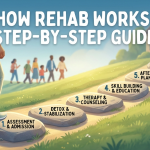Cognitive behavioral therapy (CBT) has turned out to be one of the most helpful types of psychotherapy in the management of different disorders. CBT is a client-focused, goal-oriented approach and has tangible techniques for the change of cognitive processes and develop maladaptive patterns. This blog is aimed at discussing numerous advantages of using CBT and why this therapy is popular all over the world.
What is Cognitive Behavioral Therapy?
Cognitive Behavioral Therapy (CBT) is an approach to talk therapy that interconnects the ideas, emotions, and actions of an individual. CBT was created in the 1960s by Dr. Aaron Beck and focuses on the concept of change by preparing a cognitive or behavioral change. Compared to some forms of talk therapies which involve a profound analysis of personal history and experiences, CBT is very much present-centred and applied.
Key Principles of CBT
CBT operates on several core principles:
- Cognition, feeling, and behavior are interconnected concepts. This means that entertaining negative thoughts leads to unhelpful behaviors as well as the distress that forms a cycle.
- Distortions are regarded as cognitive processes of various mental health disorders and are well known. Seeking and replacing these distortions are among the assumptions inherent in CBT.
- CBT is an educational approach that consists of tasks that are carried out between sessions for instance, keeping diaries or practicing new ways of handling stress.
- Short-term and goal-oriented. CBT is goal-directed towards certain end products that have to be delivered in a comparatively short period or stage-wise, so it could be regarded as being highly effective.
Benefits of Cognitive Behavioral Therapy
1. Effective for a Wide Range of Conditions
CBT is highly versatile and effective for various mental health conditions, including:
Anxiety disorders: The different diseases that the author has discussed include generalized anxiety disorder, panic disorder, and social anxiety disorders.
Depression: Providing help for individuals who want to leave the cycle of negative thinking.
Post-Traumatic Stress Disorder (PTSD): Interference and mood breakdown of the obsessive thinking and affective reactions.
Obsessive-Compulsive Disorder (OCD): Special focus on compulsions and obsessions.
- Phobias: Behavior modification and cognitive techniques by which an individual is gradually exposed to his fears so that the extent of fears/ phobia is diminished.
- Substance Use Disorders: Reducing stress and providing guidance and support for creating better and less toxic ways of dealing with stress.
2. Empowers Individuals to Take Control
OPC is one of the key targets in therapy and CBT has a major strength in achieving OPC, necessary when a client becomes an independent therapist. Because CBT provides thought-challenging and behavioral experiments that can be methods of dealing with mental health problems, its recipients can deal with their health all by themselves.
3. Short-Term and Cost-Effective
Hence, in contrast to a long-term psychoanalysis based on unconscious material CBT is brief and may last from 6 to 20 sessions. Its approach is also reasonable and efficient in terms of the needs of many people, which not only contributes to saving time but also helps to reduce the general costs of therapy.
4. Customizable and Flexible
CBT may be used to respect the individual traits of a certain person and what this person has to face. Whether face-to-face with a therapist over the written word or using the internet as the medium, CBT’s flexibility ensures it can get to clients with diverse experiences.
5. Focuses on the Present
Through what it asks people to do, namely consider present problems and things to do about them, CBT empowers people. It is especially helpful at present to anyone who is troubled by some occurrence in the past or alarmed by the future.
6. Addresses Cognitive Distortions
CBT is especially effective in identifying and challenging cognitive distortions such as:
- Black-and-white thinking: Categorizing every situation as having only the beneficial outcome or only the deleterious outcome.
- Catastrophizing: It is now necessary to think about the most probable of all calamities that will occur.
- Overgeneralization: This Means jumping to conclusions or generalizing based on poor research and little evidence.
Deconstructing such distortions assists people to shift to more functional perceptual styles.
7. Improves Emotional Regulation
CBT helps you understand skills for dealing with higher arousal states, which include anger, sadness, or fear. To support this goal, more anamnestic techniques such as mindfulness and relaxation techniques are used.
8. Enhances Problem-Solving Skills
CBT for problem-solving skills involves the subdivision of problems into workable stages and the identification of possible solutions. This approach enables one to build strength in dealing with various issues in life.
9. Promotes Long-Term Benefits
Most of the skills practiced during CBT are not restricted to the clinic or therapy section alone. People also note that such tools are useful at any age with no brief relapse for being applied to an individual’s life course to stipulate the enhancement of mental health.
10. Scientific Backing and High Success Rates
CBT has been subject to numerous research studies and the results point to its efficiency. It has been used in a lot of research abroad and it has been proven that it is effective in treating mental illness more than drugs and other forms of therapy. It is evidence-based and as such is trusted by most healthcare providers and patients who use the Internet to seek information.
How CBT Works
CBT typically involves the following steps:
- Assessment: The therapist asks the individual questions and assesses the problem areas of the person, to establish the SMS of therapy.
- Psychoeducation: Although, learning a relationship between thoughts, feelings, and behaviors is something that can always be learned.
- Identifying Negative Patterns: Understanding specific thinking patterns and behavioral actions that are not helpful.
- Challenging and Restructuring: The following strategies can also be employed; challenging and notes such as replacing negative thoughts with other productive thoughts like thought records.
- Behavioral Experiments: Practical application of new behaviors and methods of coping with stresses in interpersonal relationships.
- Review and Relapse Prevention: The aspects of reviewing progress and providing people with tools on how to sustain such progress.
Who Can Benefit from CBT?
CBT is effective for both the young and the old, the young people, and adults. It is especially useful to those who do not want to spend much time on theory-based treatments, and it is given with the clear aims stated. Furthermore, CBT is practiced in individual therapy and it can be used in groups in the presence of other therapies or in conjunction with medication.
Limitations of CBT
While CBT has many advantages, it’s important to acknowledge its limitations:
- Requires Active Participation: The key elements in CBT are based on the readiness and commitment of the person to participate and work through tasks during therapy.
- Not Suitable for All Issues: Some severe or prolonged trauma may need treatment approaches.
- Initial Discomfort: Learning how to stop negative thoughts and behaviors isn’t always easy at the start of the process.
Seeking Help
Cognitive behavioral therapy is one of the most effective approaches to the latter. Due to its special feature of positive behavioral transformations, derived from its practicable techniques, its primary focus on the present, and its ability to empower the patient, positive Behavioral Therapy is one of the best therapy choices. No matter what specific issues you might be facing – anxiety, depression, or anything else – CBT provides you with the means to take back your life.

Excited to build the next step for a better life experience and improved wellness? Get exclusive CBT from Orlando Treatment Solutions and find what you need to suit your condition. Reach Out to us today to find out how CBT can change your life.



























